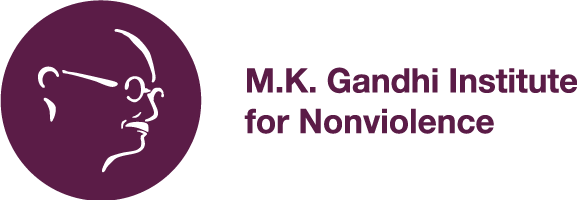This piece, written by Gandhi Institute Board Member Gwen Olton, was originally published in The Apex.
Here are some of the most common phrases I hear in the beginning of working on a conflict with someone in roller derby:
- I’m just here to play
- I’m not here for the drama
- This isn’t what derby is about
- This isn’t why I joined
These statements are pointing to the fatigue, and sometimes indignation, someone might feel when they’re having to work on interpersonal situations that are usually complex, embedded within problematic social contexts, and not particularly rife with solutions. It’s no wonder we get overwhelmed or exhausted when few of us have had much instruction, formal or informal, on navigating conflict. It’s hard to do when the stakes are low and even harder when emotions and adrenaline are running high.
My aim in this piece is to offer some frameworks for understanding conflict in the context of roller derby and some suggestions for how to navigate at least some aspects of these challenges.
Some descriptions
First, some descriptions of conflict. Let’s call conflict any misalignment of views, opinions, practices, and/or strategies that cause some kind of discomfort between one or more of the parties. This misalignment may happen at any of the following levels
- Between groups — intergroup. E.g. between two leagues, between a league and a community group
- Within groups — intragroup. E.g. between two teams within a league, between players and coaches
- Between individuals — interpersonal. E.g between teammates, between members of a committee
- Within individuals — intrapersonal. E.g. feeling torn or conflicted within oneself
I’m going to focus primarily on interpersonal conflict here, although I’ll note that most interpersonal conflicts have their roots in structural and systemic problems.
Conflict in derby
So why is that we can’t seem to just show up and play without conflict? Here are my top four answers to this, though I have many more!:
- Conflict is inevitable. Probably anyone who has studied conflict will tell you this. And I think if we keep it’s inevitability in mind it can bring us some ease when we’re feeling really stressed out about how hard things can get.
- Conflicts typically happen, at least in part, because of poorly functioning systems and structural issues. Confusion around decision-making and poor information flow are often top of the list for instigating conflict. So are oppressive and racist structures that are embedded in places where patriarchy and white supremacy are the norm. As my mentor Miki Kashtan has said, “Any system that is not set up explicitly inherits the ways of operating of the dominant culture”. Just because we want to create anti-racist, anti-oppressive, inclusive, trauma-informed, culturally-responsive and generally good spaces doesn’t mean we know how to set systems up to actually function in this way.
- Lack of creativity and dismissive approaches to emotional functioning between individuals and groups. (This is actually related to white supremacy and patriarchy and thus falls under the bullet above but it’s so important, I’m giving it it’s own space)
- The part of our nervous system that gets us ready for practices and games may also increase our likelihood for conflict. When our sympathetic system is triggered we may:
- Have less accuracy in reading of facial expressions, body language, and tone, skewing towards the negative because this is most likely to keep us safe.
- Be more likely to display anger, especially if even part of our brains think others are watching
- Have more trouble accessing our “upstairs” or “thinking” brains and thus temporarily lose some capacity around empathy and decision-making
- Display cues to others that we are angry, disgusted, or threatened by them
What we can do
Ok, so conflict is going to happen and it doesn’t mean you or your league are terrible or that no one knows how to act like an adult or any other dismissive thing we may sometimes say when we’re frustrated. Most of the work of conflict transformation happens between our ears so my main tip is this: try to reframe what conflict/drama/fights mean in your own head. Reframing conflict as information can be a critical first step in figuring out what to do next. Something wasn’t working well and now you know about it. Now, you have the opportunity to make something that will work better for everyone, but it’s going to take some work and probably a bit of courage. Here are some more tips, relative to your position to the conflict:
If you’re in a conflict and have access to a 3rd party:
In general, if you have a third party in your league, I suggest using them! And using them sooner rather than later. I encourage folks to talk with me about a conflict when it’s more like a lit match or small campfire of a conflict rather than waiting until it’s a raging forest fire. My only caveat here is that you may not have a third party in your league with any training in working on conflicts. This doesn’t mean they’re bad at it, in fact, tons of untrained folks are really naturally fantastic at helping others manage or transform conflicts. But occasionally, if something is a particularly thorny issue, or it’s a protracted conflict it can be outside the skillset of your average conflict volunteer. Try meeting with the 3rd party one on one and talking through with them what is going on, how you’re feeling, and what you’re hoping to have happen. Talking about what you want to have happen doesn’t mean you’ll get it, but a little clarity about what we want can go a long way in de-escalating a conflict.
If you’re in a conflict and don’t have access to a 3rd party:
Talk with someone that you trust who is outside of the conflict. We all have people we might talk to when we’re fired up about something that we know will jump on our bandwagon and fire us up even more. It will feel really validating in the moment, and there’s definitely a good time and place for that, but it’s probably not going to help you get through the conflict. Who do you talk to that you know will bring out your best self? Talk with that person until you feel heard and understood. If the issue needs to be brought back to the person you have a conflict with, then you may even see if this trusted friend will help you practice what you want to express. This may seem ridiculous but just like you had to practice a hockey stop in order to use it in a game, you have to practice new communication strategies in order to pull them out when the time is right. If you haven’t prepared to try something new then the same old habits of speech are going to come out when it’s go-time. Usually for a conflict to start to de-escalate between two people, one of the parties has to agree to “listen first”. If you’ve done the work of getting some empathy and understanding from a friend, then you might be in a good position to listen first.
If you’re the 3rd party for your league:
Setting aside general conflict resolution and mediation skills, here are some other tips I have for 3rd parties in derby leagues:
- Have clarity about accountability structures in your league. In general, organizations and groups will default to the accountability and justice models of the dominant culture. Often, this will be punitive and retributive. If you don’t want your league to operate under carceral logic you will actively need to create a different accountability system, such as transformative justice models.
- Don’t fall into the trap of doing all the work on a conflict. Many of us grow up with conflict styles that default to avoidant. So a conflict might happen between two league mates with everyone in the league knowing about it for a long time but no one quite sure what to do about it. You may get asked by league leadership to “take care of” a complicated conflict, including determining who is “right” and “wrong” and how they should be “punished” (sidenote: sometimes we say “determine consequences” but I frequently find this is code for punishment). In order for league members to trust that they can talk to you about sensitive topics they’ll likely need to trust that you can be non-judgmental, which is tricky to pull off if you’re required to “punish”. There may indeed be a need for accountability for harms done, but hopefully you have a system in place for that and you’re not the enforcer, or sole enforcer, of the accountability structures.
- Set boundaries that work for you. When people are in a conflict, especially if they have close relationships, it can be all consuming. They may want to talk with you for hours at a time, multiple days a week. Believe it or not, talking about it that much may not actually be best for them, and it probably isn’t what’s best for you. Feeling resentful is usually a good indicator that you need some firmer boundaries around your time and emotional space.
- If you don’t have any training in conflict resolution, see if your league can pay for you to get some!
- Be gentle with yourself, conflict is hard and stressful even when it’s not your own! It’s ok to not know what to do. Be transparent with people about your skill level and tap out if you’re in over your head.
I hope this is useful for one or more of you and am almost always happy to chat more about any of this with folks who are interested.




